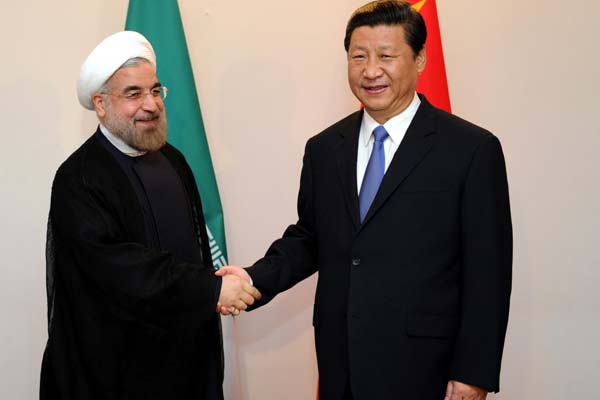Xi welcomes talks on Iran nuclear issue
Iranian president says negotiations could lead to 'win-win' outcome
President Xi Jinping said on Thursday he welcomed Iran's openness to begin talks with world powers over its nuclear program and said he respects the country's legal rights concerning nuclear energy.
Chinese observers said the new Iranian government is showing more flexibility in resolving issues related to its nuclear program but that Teheran will by no means suspend its right to the civilian use of nuclear energy.
 |
|
President Xi Jinping meets with his Iranian counterpart Hassan Rouhani in Bishkek, capital of Kyrgyzstan, on Thursday. Xi said he supports Iran's proposal for renewed negotiations on its nuclear program and its peaceful use of nuclear energy.[xie huanchi / xinhua] |
Xi made the remarks in talks with Iranian President Hassan Rouhani, the first meeting between the two since they took office earlier this year. The two leaders are in the Kyrgyz capital of Bishkek to attend a Shanghai Cooperation Organization summit on Friday.
The meeting comes two days after Rouhani said Iran is ready to strike a deal over its nuclear program during negotiations he proposed in New York, where he is slated to attend the United Nations General Assembly this month.
The Iranian president said the upcoming negotiations over the nation's nuclear program should lead to a "win-win" outcome.
During Thursday's meeting, Xi said he expects "relevant parties to focus on promoting practical dialogue, seek a mutually beneficial solution and consolidate the momentum of peaceful settlement".
Xi added that China respects Iran's "justified and lawful rights and interests" and insists that issues with Iran's nuclear program be solved through dialogue and negotiations.
He also promised Rouhani that Beijing will make a "constructive effort" to promote peace and progress in talks over Iran's nuclear program.
Rouhani told Xi his country is developing nuclear energy for peaceful purposes and that the program is within the framework of international law and the Treaty on the Non-Proliferation of Nuclear Weapons. Western countries have long charged that Iran is secretly developing nuclear weapons.
"Iran would like to accept supervision from the International Atomic Energy Agency and to eliminate worries from international society through cooperation," said Rouhani in a news release from the Chinese Foreign Ministry.
Rouhani, who said he welcomes China's constructive role in promoting peace, noted that the relationship between Iran and China is "very important" and that it "bears vital significance for Asia and the sensitive Middle East issue".
He said Iran is willing to work with China on various initiatives and issues, such as trade, and to open channels of communication on regional affairs.
The press release also said that Xi and Rouhani discussed the situation in Syria, without giving more details. Iran and Syria, both major regional players, have forged close ties.
Both China and Iran have said they object to military strikes on Syria for its alleged use of chemical weapons.
The last round of talks on the Iranian nuclear program between the five permanent members of the UN Security Council and Germany took place in April in Kazakhstan, before Rouhani's election. Each nation has expressed the desire to continue talks soon.
"Since President Rouhani took office in August, he has shown a flexible diplomacy in nuclear talks," said Wu Sike, China's envoy to the Middle East. "But Iran will never change its stance on the nuclear issue and will stick to its right to use nuclear technology peacefully and raise its capability to use nuclear energy."
Dong Manyuan, a researcher at the China Institute of International Studies, said Teheran will "firmly implement the nuclear plan despite international pressure".
"Now the Rouhani government is on one side, insisting on its rights to the peaceful use of nuclear energy, while the other side wants Iran to seek (international) acceptance and recognition of it," Dong said.
Contact the writer at [email protected]
Mo Jingxi in Beijing contributed to this story.



























